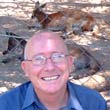
He started out researching frogs in Australia but Dr Robert Browne’s career in wildlife conservation eventually saw him running a Panda dating service in the USA.
The environmental scientist now works as an industry and government consultant and a tutor for Australian Correspondence Schools. He said the beauty of the wildlife conservation field was the variety of work available.
“There’s a lot of different levels – you can do environmental science where you look after the environment by managing a national park,” he said.
“At the other end of the spectrum you can look at biodiversity conservation and work on preserving different species groups.”
While the step from frogs to pandas may not seem an obvious one, Dr Browne said it was a perfect example of the diverse opportunities available to wildlife conservation experts.
“I went to Memphis Zoo for two years to do work on an endangered frog species,” he said.
“It ended up being part of my job to monitor the reproductive cycles of the pandas. They are funny animals. They only come on heat once a year so you have a three-day window (where pregnancy is possible).
“I did some successful match-making but they haven’t had any babies yet because pandas don’t seem to like sex very much. They would rather play and roll around and look into each other’s eyes affectionately!”
Dr Browne said people interested in a career in wildlife conservation could start by studying a specialised course through Australian Correspondence Schools.
“They have a lot of solid courses that would give you a foot in the door and could help you get into a university course or a research project,” he said.
“If you started out doing a course in environmental management or marine studies and combined that with volunteer work in the relevant field, that would be an excellent foot in the door.
“Working in wildlife conservation is definitely one of the most rewarding jobs you can do.”
For more information about wildlife, environment and conservation courses, visit www.acs.edu.au.